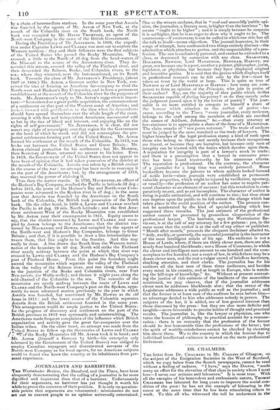JOURNALISTS AND BARRISTERS.
THE Westminster- Review, the Standard, and the Times, have been eloquently demonstrating that the calling of a journalist is far more dignified and important than that of a barrister. Unfortunately for their arguments, no barrister has yet thought it worth his while to prove the converse of their position. It is only on question- able points that arguments are volunteered : missionaries do not let out to convert people to an opinion universally entertained. One oi the writers declares, that in "real and unworldly publicopi- nion, the journalist, a literary man, is higher than the barrister ": he
means "ought to be higher " ; and it is simply because he suspects
it is not higher, that he is so eager to show why it ought to be. The controversy—if controversy it can be called in which one side has all
the talk to itself—seems objectless. The journal-laureates, in their songs of triumph, have confounded two things entirely distinct—the admiration which attaches to genius, and the respectability of a pro- fession. The one is exclusively personal, and cannot be extended to a class, or depressed by connexion with any class. SHAKSPERE, HOGARTH, NEWTON, Lord MANSFIELD, BENTHAM, HARVEY, are
great, not because one is a poet, another a painter, philosopher, jurist, legislator, or physician, but because they have displayed original and inventive genius. It is said that the genius which displays itself in professional research can be felt only by the few—must be taken on trust by the world at large. This is quite as true of NEWTON as of Lord MANSFIELD or HARVEY how many are com- petent to form an opinion of the Principia, who join in praise of their author? Nay, are the majority of that public which deifies SHAKSPERE capable of feeling his poetry ? or do they merely echo the judgment passed upon it by the lovers of poetry ? The jour- nalist is no more entitled to arrogate to himself a share of the honour which attaches to the author of genius —be- cause, according to the Times, "every journalist, every reviewer,
belongs to the craft among the members of which are enrolled the names of Addison, Johnson," &c.—than every attorney or law-stationer is to appropriate a share of the fame of a MANSFIELD. The claim smacks of "nos puma natamur." The trade of authors must be judged by the same standard as the trade of lawyers. The higher branches of the legal profession stamp a kind of rank upon those who belong to them—not merely because their occupations are liberal, or because they are lucrative, but because only men of integrity can be trusted with the duties which devolve upon them. A reputation for integrity is part of a lawyer's stock in trade; and there is a presumption that a lawyer in extensive prac- tice has been found trustworthy by his numerous clients. The reputation is professional. On the contrary, the character of a journalist for a long time was entirely personal. Since booksellers became the patrons to whom authors looked instead of noble lords—since journals were established as permanent valuable properties, which might be injured by vacillation, apostacy, or venality—the profession of an author has come to require per- sonal character as an element of success : but this revolution is com-
paratively recent, and as yet incomplete. The character of author is
rising in public estimation, and will continue to rise ; but time alone can impress upon the public to its full extent the change which has taken place in the social position of the author. The process can- not be accelerated by the kind of special-pleading which has suggested these remarks. The just estimate of the professional author cannot be promoted by groundless vituperation of the professional lawyer. The barrister, says the Westminster Re- viewer, is at the call of any attorney for a few guineas : yes, in the same sense that the author is at the call of any editor or publisher.
"Month after month," proceeds the eloquent declaimer alluded to, "daily, weekly, or quarterly, the successful journalist is the instructor of the most intelligent minds of his age. His audience is not a House of Lords, where, if there are thirty clever men, there are also nearly four hundred blockheads ; nor a House of Commons, in which the clever and intelligent men amount to one hundred and the com- monplace to five hundred ; nor a court of law, in which there may be a dozen clever men, and the rest a vulgar crowd of briefless barristers, sharking attornies, and their clerks. The journalist has for his auditors all the best men of these three audiences, and besides every mind in his country, and at length in Europe, who is watch- ing the hill-tops of knowledge," &c. Without at present contest- ing the justice of this estimate of the intellects of the assemblies mentioned, we may observe, that if the journalist addresses clever men he addresses blockheads also ; that the orator of the
Legislature addresses a wide public as well as the journalist ; and that the former is at least sure of the auditors he sees before him—
an advantage denied to him who addresses nobody in person. The subjects of the bar, it is added, are of less general interest than those discussed by the press : but they are also more definite and tangible—more favourable to precise habits of thought and practical results. The journalist is, like the lawyer or physician, one who turns the lessons of philosophy to practical account for a remune- ration: there is no necessity that the profession of the former should be less honourable than the professions of the latter; but the spirit of worldly-mindedness cannot be checked by elevating him above them. Wo to the country in which the honour due to individual intellectual eminence is wasted on the mere professional litterateur.


























 Previous page
Previous page